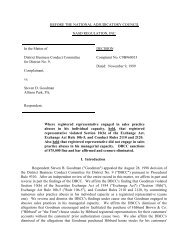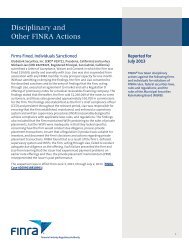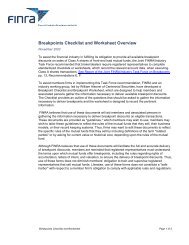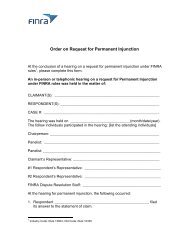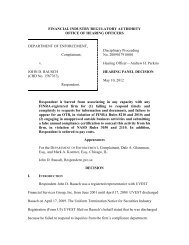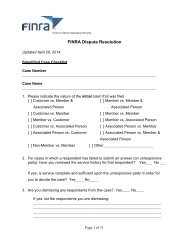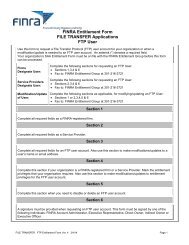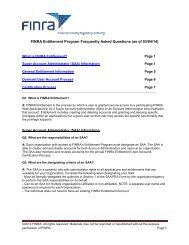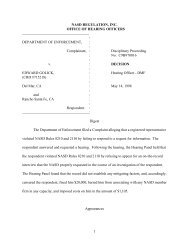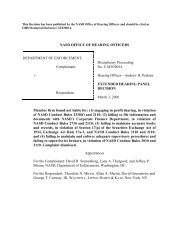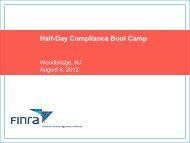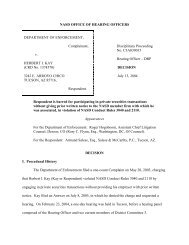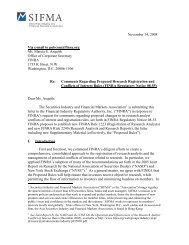NASD OFFICE OF HEARING OFFICERS - finra
NASD OFFICE OF HEARING OFFICERS - finra
NASD OFFICE OF HEARING OFFICERS - finra
Create successful ePaper yourself
Turn your PDF publications into a flip-book with our unique Google optimized e-Paper software.
<strong>NASD</strong> <strong><strong>OF</strong>FICE</strong> <strong>OF</strong> <strong>HEARING</strong> <strong><strong>OF</strong>FICE</strong>RS<br />
DEPARTMENT <strong>OF</strong> ENFORCEMENT,<br />
v.<br />
Complainant,<br />
MORGAN KEEGAN & CO., INC.<br />
(CRD No. 4161),<br />
RESPONDENT 2,<br />
RESPONDENT 3,<br />
Respondents.<br />
Disciplinary Proceeding<br />
No. CAF040073<br />
Hearing Officer – RSH<br />
Hearing Panel Decision<br />
July 21, 2006<br />
Respondents Morgan Keegan and Respondent 2 violated <strong>NASD</strong> Conduct Rule 2110<br />
by selling unregistered securities in violation of Sections 5(a) and 5(c) of the<br />
Securities Act of 1933. For this violation, Morgan Keegan was censured and fined<br />
$22,300 and Respondent 2 was censured and fined $2,500. Respondent 3 violated<br />
<strong>NASD</strong> Rules 3010 and 2110 by failing to supervise Respondent 2. For this violation,<br />
he was issued a letter of caution.<br />
Appearances<br />
Rebecca A. Donnellan, Sherri Evans Harris, Daniel D. McClain, Washington, DC (Rory<br />
C. Flynn, <strong>NASD</strong> Chief Litigation Counsel, Washington, DC, Of Counsel) for the<br />
Department of Enforcement.<br />
Joseph D. Edmondson, Jr., Akita N. Adkins, Marc B. Dorfman, Michael D. Wolk, of<br />
Foley & Lardner, LLP, for Morgan Keegan & Co., Inc., Respondent 2, and Respondent 3.<br />
I. Procedural Background<br />
DECISION<br />
The Department of Enforcement (“Enforcement”) filed a Complaint against<br />
Morgan Keegan & Co., Inc. (“Morgan Keegan”), Respondent 2 and Respondent 3 on<br />
September 30, 2004. The two-cause Complaint charged that (1) Morgan Keegan and<br />
Respondent 2 violated <strong>NASD</strong> Rule 2110 by selling unregistered securities in violation of
Sections 5(a) and 5(c) of the Securities Act of 1933 (“Section 5”); and (2) Respondent 3<br />
violated Rules 2110 and 3010 by failing to supervise Respondent 2.<br />
Respondents filed an Answer on October 29, 2004 in which they denied the<br />
charges and requested a hearing.<br />
The hearing was held on November 29 and 30 and December 1, 2005 in<br />
Memphis, Tennessee before a Hearing Panel composed of the Hearing Officer, a current<br />
member of <strong>NASD</strong>’s District 5 Committee and a former member of <strong>NASD</strong>’s District 10<br />
Committee. Enforcement called three witnesses: Respondent 2; Beth Ducrest, a Morgan<br />
Keegan compliance administrator; and Chae Yi, an <strong>NASD</strong> investigator. 1 Enforcement<br />
also introduced 25 exhibits into evidence. 2 The Respondents called three witnesses:<br />
Respondent 2; Respondent 3; and James Ritt, Morgan Keegan’s General Counsel and<br />
Chief Compliance Officer. The Respondents introduced 19 exhibits into evidence. 3 The<br />
parties jointly submitted a Stipulation of Undisputed Facts. 4<br />
The parties’ final post-hearing submissions, which included briefs and proposed<br />
findings of fact and conclusions of law, were filed on February 28, 2006.<br />
II. Respondents<br />
Tennessee. 5<br />
Morgan Keegan is a large regional <strong>NASD</strong> member firm based in Memphis,<br />
Respondent 2 received his General Securities Representative license (“Series 7”)<br />
in 1986 and his General Sales Supervisory license (“Series 8”) in 1998. Between July<br />
1986 and November 1997, Respondent 2 was a registered representative of A.G.<br />
1<br />
The hearing transcript is referred to as “Tr.”<br />
2<br />
Exhibits CX-1, 3-8, 10-23, 26-29.<br />
3<br />
Exhibits RX-1, 3, 4, 9, 14, 38, 41-45, 52-59.<br />
4<br />
The Stipulation of Undisputed Facts is referred to as “Stip.”<br />
5<br />
Stip. 1.<br />
2
Edwards. 6 Respondent 2 has been a registered representative of Morgan Keegan since<br />
1997. He worked and acted as an assistant branch manager in Morgan Keegan’s Rogers,<br />
Arkansas office during 2002. As assistant branch manager, Respondent 2 acted as<br />
supervisor when the branch manager was out of the office. 7 Prior to serving as an<br />
assistant branch manager, Respondent 2 had served as branch manager of the Rogers<br />
office. 8 In 2002, Respondent 2 handled approximately 300 accounts, the majority of<br />
which were retirement plans and individual retirement accounts invested primarily in<br />
mutual funds. 9 In 2002, Respondent 2 had a general knowledge of procedures for<br />
handling restricted and control stock, but limited actual experience in dealing with it. 10<br />
Respondent 3 received his Series 7 license in 1981 and his Series 8 license in<br />
1996. He was the branch manager for Morgan Keegan’s Rogers office during 2002. He<br />
had supervisory authority over the account activities of the five brokers in the Rogers<br />
office and was responsible for supervising Respondent 2. Respondent 3 left the industry<br />
in December 2002; however, <strong>NASD</strong> has jurisdiction over him because he was an<br />
associated person at the time of the activities at issue and Enforcement filed the<br />
Complaint within two years of Respondent 3’s termination of his registration. 11<br />
III. Findings of Fact<br />
A. Summary<br />
On January 23, 2002, MR, a trustee for the Genesis Trust (“Trust” or “Genesis”)<br />
opened an account with Respondent 2 in Morgan Keegan’s Rogers, Arkansas office. 12<br />
6 Tr. at 144.<br />
7 Stip. 2; Tr. at 35-36.<br />
8 Tr. at 172.<br />
9 Tr. at 36-38.<br />
10 Tr. at 168-172.<br />
11 Stip. 3, 4; Tr. at 464-469.<br />
12 RX-39; Stip. 5.<br />
3
On January 25, 2002, MR delivered for deposit into Genesis’ account a certificate<br />
representing 1,375,000 shares of Golf Entertainment, Inc. (“Golf”), a penny stock that<br />
was thinly traded on the Over the Counter Bulletin Board (“OTCBB”) market. 13 Genesis<br />
immediately began selling and transferring the Golf stock. Between January 25, 2002<br />
and May 14, 2002, Genesis sold 865,000 shares into the market and transferred 140,000<br />
shares to other accounts at Morgan Keegan. 14 On May 14, 2002, Genesis deposited an<br />
additional 6,375,000 shares of Golf stock into its Morgan Keegan account. 15 Between<br />
May 17, 2002 and August 28, 2002, Genesis sold 250,000 shares and transferred 750,000<br />
shares of Golf from its Morgan Keegan account. 16 All told, between January 25, 2002<br />
and August 28, 2002, Genesis sold 1,115,500 shares of Golf and transferred 890,000<br />
shares. 17 Its net proceeds from the sales were $51,001. 18 Morgan Keegan’s commissions<br />
on the sales were less than $3,800 and of that, Respondent 2 earned less than $1,500. 19<br />
Enforcement alleges that the Golf shares were not registered, and that by selling<br />
and transferring the shares on behalf of Genesis, Morgan Keegan and Respondent 2<br />
violated Section 5, and thereby violated Rule 2110. Enforcement also alleges that<br />
Respondent 3 failed to exercise reasonable supervision over Respondent 2.<br />
It is undisputed that all of the Golf stock Genesis sold was unregistered. 20<br />
Nevertheless, sales of the stock would not have violated Section 5 if the stock or<br />
transactions in it had been exempt from registration. Respondents had the burden of<br />
proof on that issue; however, they failed to satisfy their burden. Morgan Keegan did not<br />
13<br />
Stip. 8, 68.<br />
14<br />
Stip. 10.<br />
15<br />
Stip. 18.<br />
16<br />
Stip. 23.<br />
17<br />
Stip. 35, 74; RX-38 at ENF02938-02940.<br />
18<br />
Stip. 75.<br />
19<br />
Stip. 32.<br />
20<br />
Stip. 9, 19.<br />
4
determine that the transactions qualified for any exemptions from registration before<br />
executing the transactions, and the Respondents concede that they are now unable to<br />
prove that the transactions qualified for any exemptions. 21<br />
Therefore, the Hearing Panel concluded that Morgan Keegan and Respondent 2<br />
violated Section 5. The Respondents argued that although they might have violated<br />
Section 5, they acted reasonably under the circumstances, and so should not be found to<br />
have violated Rule 2110. The Hearing Panel rejected that argument as unsupported by<br />
law and concluded that Morgan Keegan and Respondent 2 violated Rule 2110.<br />
In arguing for the imposition of more lenient sanctions than those requested by<br />
Enforcement, Respondents argued that their failure to recognize that the Golf stock was<br />
unregistered or restricted was reasonable and that there was nothing more they could<br />
have done to prevent the release of unregistered securities into the market. After<br />
examining the Respondents’ actions under all of the circumstances surrounding Genesis’<br />
deposits and transactions in Golf stock, the Hearing Panel disagreed with Respondents’<br />
assessment of their conduct.<br />
The Hearing Panel also concluded that Respondent 3 failed to exercise reasonable<br />
supervision of Respondent 2.<br />
21 Stip. 37; Respondents’ Post Hearing Brief at 2, 3.<br />
5
B. Chronology of Events<br />
1. The Genesis Trust Opens an Account at Morgan Keegan<br />
On January 23, 2002, MR met with Respondent 2 in Morgan Keegan’s Rogers<br />
office to open an account for the Genesis Trust. 22 Although Genesis was a new<br />
customer, Respondent 2 had heard of MR, a local businessman. Respondent 2 was<br />
aware that prior to 2002, MR had met with another broker in Morgan Keegan’s Rogers<br />
office to discuss the possibility of a public offering of shares in MR’s company.<br />
Respondent 2 testified that he was familiar with MR’s company, and that although<br />
Morgan Keegan did not take MR’s company public, the proposed transaction gave MR<br />
some credibility. 23 In addition, MR told Respondent 2 that he had been referred by one<br />
of Respondent 2’s former customers, JB. JB had opened an account at Morgan Keegan<br />
in March 2001 for the purpose of depositing a stock certificate. JB, in turn, had been<br />
referred to Respondent 2 by TA, another Morgan Keegan customer. Both JB and TA<br />
had deposited stock in certificate form into their accounts at Morgan Keegan.<br />
Respondent 2 was aware that Morgan Keegan’s back office had found that JB’s<br />
certificate was not in good deliverable form and returned it to him. 24 Respondent 2<br />
testified that all of these facts gave him a “comfort level” with MR—he believed that<br />
MR and JB knew that Morgan Keegan would catch any irregularities. 25<br />
Respondent 2 gathered and recorded information from MR on a new account form<br />
for Genesis. MR told Respondent 2 that the purpose of Genesis was to “hold securities”<br />
22<br />
RX-39; Stip. 5.<br />
23<br />
Tr. at 152-155.<br />
24<br />
Tr. at 40-42; RX-30 at ENF00930-00937.<br />
25<br />
Tr. at 201-202.<br />
6
and that the Genesis beneficiaries were “some businessmen in the area.” 26 Respondent 2<br />
completed the new account form for Genesis, and based on MR’s responses to questions,<br />
noted that Genesis was not an officer, director or 10% shareholder of any public<br />
company and that Genesis did not have any other securities accounts. 27 Respondent 2<br />
signed the new account form as the registered representative on January 23. Because<br />
Respondent 3 was out of the office, Respondent 2 also signed the new account form as<br />
the acting branch manager on January 29. 28 Respondent 2, Respondent 3 and Ritt<br />
(Morgan Keegan’s chief compliance officer and general counsel) all testified that, at that<br />
time, Morgan Keegan allowed assistant branch managers to approve their own accounts<br />
when the branch manager was out of the office. 29 In accordance with Morgan Keegan’s<br />
policy, Respondent 2 required MR to sign a trustee certification, which certified that he<br />
had authority to act on behalf of the trust. A second person, CR, was also listed as a<br />
trustee, and Respondent 2 called him to verify that he was a trustee and that Genesis was<br />
not an affiliate or 10% shareholder of any publicly-traded company. 30<br />
2. The Genesis Trust Deposits Shares of Golf Entertainment<br />
When MR opened the account for Genesis, he told Respondent 2 that he intended<br />
to deposit stock in certificate form so that it could be sold. Initially, MR did not tell<br />
Respondent 2 the name of the stock. 31 When he later disclosed that the stock was Golf,<br />
MR stated that Genesis had received the shares from the company for “goods and<br />
services” rendered to Golf by Genesis. Respondent 2 did not ask whether the stock was<br />
26 Tr. at 42-44.<br />
27 RX-39; Tr. at 47-48, 50.<br />
28 Stip. 5; Tr. at 38.<br />
29 Tr. at 38, 487-489, 700, 712.<br />
30 Stip. 7; Tr. at 51-53.<br />
31 Tr. at 43.<br />
7
estricted; however, the certificate did not contain a restrictive legend. 32 The 1,375,000<br />
shares of Golf were not registered; 33 however, none of the Respondents appreciated that<br />
fact at the time the shares were deposited. At the time Genesis deposited the Golf stock,<br />
Morgan Keegan had written policies and procedures in place to prevent and detect the<br />
sales of unregistered securities in violation of Section 5, but Respondent 2 did not follow<br />
those procedures because it did not occur to him that the Golf stock was unregistered,<br />
restricted or control stock. 34<br />
When MR deposited the Golf stock certificate, Respondent 2 believed that Golf<br />
was a “communications company primarily in the business of Spanish language<br />
television stations.” 35 Respondent 2 looked up Golf on his computerized quotation<br />
system and found that the company traded on the OTCBB, and had a bid and ask<br />
quotation. MR told Respondent 2 that Golf had over 500 million shares outstanding.<br />
Respondent 2 did not try to verify that number. 36 Respondent 2 testified that Golf stock<br />
was trading for “six or eight cents a share.” 37 He believed 500 million shares<br />
outstanding was a reasonable number for a penny stock company; at approximately six<br />
to eight cents per share the resulting market capitalization of $40 million seemed<br />
consistent with a company that owned several broadcasting entities. 38 Respondent 2<br />
relied on MR’s representation that Genesis was not an officer, director or 10%<br />
shareholder of Golf. 39<br />
32<br />
Stip. 9; Tr. at 63, 119; CX-20 at ENF03346.<br />
33<br />
Stip. 9.<br />
34<br />
Stip. 47; Tr. at 112-119.<br />
35<br />
Tr. at 66-67.<br />
36<br />
Stip. 71; Tr. at 64-65.<br />
37<br />
Tr. at 568.<br />
38<br />
Tr. at 164-165, 568-569, 581-582.<br />
39<br />
Tr. at 117-118.<br />
8
In January 2002, Morgan Keegan’s policies and procedures for opening new<br />
accounts did not require brokers or branch managers to verify any of the information on<br />
the new account form. The branch managers’ responsibility in reviewing the form was<br />
to ensure “completeness, not truthfulness.” 40<br />
3. Golf’s SEC Filings Available in January 2002<br />
At the time MR deposited the Golf stock certificate, Golf’s SEC Form 10-Q for<br />
the period ended September 30, 2001 was publicly available, having been filed on<br />
October 31, 2001. 41 Golf’s 10-Q disclosed that there were 5,293,044 shares outstanding<br />
as of October 15, 2001, not 500,000,000 as MR had told Respondent 2. Based on the<br />
number of outstanding shares cited in the 10-Q, the shares Genesis deposited in its<br />
Morgan Keegan account constituted approximately 26% of Golf’s total outstanding<br />
stock. 42 Golf’s 10-Q also disclosed that Golf had been in the business of “brokering<br />
businesses within the golf industry via the Internet” before ceasing operations in April<br />
2001. All of these facts contradicted MR’s representations to Respondent 2 when he<br />
opened the account and deposited the Golf stock.<br />
Also available in January 2002 when MR deposited the Golf stock was a Form 8-<br />
K which Golf had filed on January 8, 2002. The 8-K disclosed:<br />
On December 31, 2001, the Company acquired a significant amount of<br />
assets in a non-cash transaction…The Company acquired the assets in<br />
exchange for 3,750,000 shares of its common stock in an isolated, exempt<br />
transaction. For the purposes of this transaction the stock of the Company<br />
was valued at $0.274/share. The assets were acquired from, and the<br />
shares issued to The Genesis Trust. There is no material relationship<br />
between The Genesis Trust and the registrant or any of its affiliates, any<br />
director or officer of the registrant, or any associate of any such director<br />
or officer. The shares used to accomplish the acquisition were derived<br />
40 Tr. at 523, 690.<br />
41 CX-19.<br />
42 1,375,000/5,293,044 = 25.98%<br />
9
from the Company treasury and are deemed to be restricted, illiquid<br />
shares pursuant to Rule 144 of the Commission.<br />
Attached to Golf’s 8-K was the Restricted Stock Purchase Agreement between Golf and<br />
The Genesis Trust. The Purchase Agreement clearly stated that the shares purchased by<br />
Genesis were not registered and were restricted and that certificates evidencing the shares<br />
were to bear a restrictive legend. 43 3,750,000 constitutes approximately 71% of the<br />
outstanding shares of Golf stock disclosed in its 10-Q. 44<br />
Respondent 2 did not look for Golf’s SEC filings and did not contact Morgan<br />
Keegan’s compliance department when MR deposited the Golf stock. 45 Ritt testified that<br />
it would have been a “prudent step” for Respondent 2 to have called the compliance<br />
department when the Golf shares were first deposited. 46 Similarly, Beth Ducrest, the<br />
compliance administrator Respondent 2 eventually contacted, testified that under Morgan<br />
Keegan policies and procedures it would have been prudent for Respondent 2 to have<br />
contacted her before the sales of Golf stock, “since it was such a large certificate<br />
deposited into the account.” 47<br />
4. Sales and Transfers of Golf Stock from the Genesis Account<br />
Respondent 2’s office sent Genesis’ Golf certificate to Morgan Keegan’s home<br />
office in Memphis, Tennessee. 48 Respondent 2 and Ducrest testified that, according to<br />
Morgan Keegan’s regular practice, the certificate would have been presented to the<br />
Depository Trust Corporation (“DTC”). Golf’s transfer agent, American Stock Transfer<br />
(“AST”) would have reissued the stock to DTC in “street name.” Because restricted<br />
43 Stip. 40, 41; CX-5.<br />
44 3,750,000/5,293,044 = 71%.<br />
45 Tr. at 67, 75, 702.<br />
46 Tr. at 702.<br />
47 Tr. at 243-244.<br />
48 Tr. at 211.<br />
10
stock may not be held in street name, but must be held in certificate form, the fact that<br />
AST permitted the shares to be converted from certificate form to street name led<br />
Respondents to believe that the shares were not restricted. Respondent 2 expected that if<br />
the shares were restricted or otherwise not in good delivery, Morgan Keegan’s back<br />
office would have brought this to his attention, as it had in other cases. 49 Before<br />
executing the transactions in the Genesis account, Morgan Keegan did not attempt to<br />
determine that Genesis’s sales and transfers of Golf stock qualified for any exemption<br />
from registration because it was not aware that the shares were unregistered. 50<br />
From January 25, 2002 through April 19, 2002, the Genesis trust sold, in twelve<br />
separate transactions, 332,000 shares of Golf stock from its Morgan Keegan account to<br />
the market. During that time it also transferred 40,000 shares of Golf to three other<br />
accounts at Morgan Keegan, two of which had been opened by Respondent 2. 51<br />
Respondent 2 took most of these orders and transmitted them to Morgan Keegan’s sales<br />
desk for execution, so he was aware that Genesis transferred Golf stock to other Morgan<br />
Keegan accounts. 52<br />
5. Inquiry by Morgan Keegan’s Compliance Department<br />
On April 19, 2002, after Morgan Keegan had already executed twelve sales and<br />
three transfers of Golf stock from Genesis’ account, Respondent 2 contacted Beth<br />
Ducrest in Morgan Keegan’s compliance department. Respondent 2 testified that he<br />
contacted the compliance department because Genesis had placed large limit orders to<br />
sell Golf stock. Respondent 2 asked Ducrest if there was “anything to be concerned<br />
49 Tr. at 42, 232-233.<br />
50 Stip. 37.<br />
51 CX-4, CX-20.<br />
52 Tr. at 77-86.<br />
11
about,” given the large number of Golf shares owned by Genesis and the size of the<br />
transactions. 53 Respondent 2 did not tell Ducrest anything about Genesis as an entity,<br />
how long Genesis had owned the Golf shares, or that Genesis had acquired the shares<br />
directly from Golf in exchange for goods and services. He also did not tell Ducrest that<br />
MR had told him that Golf had 500 million shares outstanding. They did not discuss<br />
whether Genesis might be a control person of Golf or whether the shares might be<br />
restricted. 54<br />
Ducrest recalled that Respondent 2 told her only that Genesis held a large position<br />
in Golf. He wanted to know if there was “any problem with the stock being traded” and<br />
he “just wanted to double check to make sure everything was okay.” 55 She told him that<br />
“at that point [she] would pretty much pick up the ball and do the research.” Ducrest<br />
testified that she “probably” asked Respondent 2 standard questions about the affiliation<br />
between Genesis and Golf and that Respondent 2 did not tell her that they were<br />
affiliates. 56 She apparently did not ask him any other significant questions. 57 Ducrest<br />
told Respondent 2 not to conduct any more trades until she had time to research the<br />
matter. 58<br />
Ducrest undertook to review the Genesis transactions for only two issues: whether<br />
the Golf stock was restricted 59 and whether Genesis was a Golf affiliate or control<br />
53 Stip. 14; Tr. at 95-103, 109.<br />
54 Tr. at 110-111.<br />
55 Tr. at 228, 231<br />
56 Tr. at 232.<br />
57 Tr. at 228-232.<br />
58 Tr. at 230.<br />
59 Restricted securities are obtained “directly or indirectly from the issuer, or from an affiliate of the issuer,<br />
in a transaction …not involving any public offering.” Rule 144(a)(3)(i).<br />
12
person. 60 Ducrest testified that she looked at Morgan Keegan’s computer system and<br />
confirmed that the DTC held the stock in street name. This indicated to her that “there<br />
was no legend on the stock [and]…no stops from the transfer agent.” She said that<br />
answered her question about whether the stock was restricted. In her experience, even if<br />
the legend was missing for some reason, the transfer agent has a permanent record of the<br />
restriction on its computer system and will send a rejected stock certificate back to the<br />
brokerage firm with an explanation of why the stock is restricted. 61 Ducrest said the fact<br />
that AST is a large, reputable transfer agent with which she has significant dealings gave<br />
her confidence that the shares were being properly handled. 62 Ducrest testified that by<br />
the time she was researching the Golf stock in the Genesis account, the stock had already<br />
been transferred to street name. Therefore, she did not have the original certificate<br />
number and she was unable to contact AST to have it investigate whether the shares<br />
were in fact unrestricted. 63 In response to questioning from a member of the Hearing<br />
Panel, however, Ducrest admitted that the certificate was microfilmed and the certificate<br />
number would have been available on microfiche. 64<br />
To determine whether Genesis was a control person or affiliate of Golf, Ducrest<br />
reviewed page 2 of Golf’s most recent Form 10-K, which had been filed on April 15,<br />
2002. It disclosed that Golf had 9,043,004 shares outstanding. 65 She calculated that<br />
Genesis’ original 1,375,000 shares constituted approximately 16% of Golf’s outstanding<br />
60 Stip. 15; Tr. at 244, 246. Whether Genesis was an affiliate or control person of Golf was significant<br />
because a control person, such as an officer, director or controlling shareholder is considered an affiliate of<br />
an issuer. An affiliate of an issuer is treated as an issuer when there is a distribution of securities. SEC v.<br />
Cavanaugh, 155 F.3d 129, 134 (2d Cir. 1998) (interpreting Section 5 and Rule 144).<br />
61 Tr. at 232-233.<br />
62 Tr. at 279-280.<br />
63 Tr. at 293-294.<br />
64 Tr. at 304-305.<br />
65 CX-8 at ENF05929; Tr. at 234-235.<br />
13
shares. 66 Ducrest did not review any other portion of Golf’s 10-K. 67 If she had, she<br />
would have read, among other things, the following information:<br />
Approximately 11.05 million shares of our common stock were issuable<br />
or were issued and outstanding as of April 1, 2002. Of these shares, 3.75<br />
million were issued or became issuable in the period of December 31,<br />
2002 through January 20, 2002 in connection with the acquisition of<br />
various items of equipment, the rights to acquire a broadcast TV license,<br />
etc. We believe that all of these 3.75 million shares (the “Genesis block”)<br />
are “restricted securities” as that term is defined in Rule 144 promulgated<br />
under the Act...Some of our restricted shares, but not the Genesis block,<br />
have been outstanding for over one year and thus have been eligible for<br />
sale under Rule 144. We believe that only a comparatively small number<br />
of these shares have thus far been sold. 68<br />
Not having read this portion of Golf’s 10-K, Ducrest did not see that Golf had<br />
clearly disclosed that the “Genesis block” of Golf stock was restricted.<br />
Ducrest also failed to read Golf’s 8-K, discussed above. She testified that she<br />
normally would have searched for proxy statements to look for officers and directors;<br />
however, she could not say “definitely” that she had done so for Golf. Ducrest testified<br />
that after calculating that Genesis owned 16% of Golf, she “believed” she checked to see<br />
whether Genesis had filed a Form 13-D, as is required for shareholders holding more than<br />
5% of the stock. It had not. Asked if it concerned her that Genesis had apparently not<br />
made a 13-D filing, Ducrest testified that, “under normal situations,” she would have<br />
thought about it and “[t]hat has in the past been a flag.” In this particular situation,<br />
however, she did not recall if she thought about Genesis’ failure to file a 13-D. 69<br />
Because she had determined that Genesis owned 16% of Golf’s outstanding<br />
shares, on April 19, 2002, Ducrest called Golf’s general counsel, John Dodge, to ask if<br />
66 CX-11; Tr. at 235-236.<br />
67 Tr. at 237.<br />
68 CX-8 at ENF05963-ENF05964; Tr. at 237-238.<br />
69 Tr. at 241-242.<br />
14
the shares owned by Genesis were restricted or control stock. Dodge told her that he did<br />
not consider the shares owned by Genesis to be restricted or control securities. She also<br />
asked whether Dodge considered Genesis to be an affiliate of Golf and he told her that he<br />
did not. Ducrest did not ask for any explanation or support for Dodge’s opinion. When<br />
Ducrest asked whether the fact that Genesis owned 16% of Golf made it a control person,<br />
Dodge told her that he still did not think so, but he would “think about it and call [her]<br />
right back if he changed his mind.” 70 Ducrest testified that she considered Dodge to be<br />
the final source in determining whether the stock was restricted and whether Genesis was<br />
an affiliate or control person of Golf. 71 Dodge did not call her back, so on or about April<br />
19, 2002, Ducrest called Respondent 2 and told him that the Golf shares in Genesis’<br />
account were not restricted and were freely tradable. 72 She did not tell Respondent 2 that<br />
Genesis owned more than 10% of Golf’s outstanding shares. 73 The parties stipulated that<br />
Dodge, the general counsel of Golf, lied to Beth Ducrest when he represented that<br />
Genesis was not an affiliate or control person of Golf. 74<br />
6. Additional Golf Shares Deposited and Traded<br />
On May 14, 2002, Genesis deposited an additional 6,375,000 unregistered shares<br />
of Golf into its Morgan Keegan account, bringing its total holdings of Golf stock in its<br />
Morgan Keegan account to more than 6.7 million shares. The certificate for the shares<br />
did not contain a restrictive legend and apparently was converted into street name<br />
without incident. 75 Respondent 2 believed that Respondent 3 was aware of this<br />
70<br />
Stip. 17; Tr. at 233-234, 240, 246-249.<br />
71<br />
Tr. at 241, 247.<br />
72<br />
Stip. 72; Tr. at 248, 590-591.<br />
73<br />
Tr. at 301.<br />
74<br />
Stip. 30.<br />
75<br />
Stip. 18, 19; Tr. at 120, 592.<br />
15
additional deposit of shares; however, he did not recall a specific conversation about it<br />
with Respondent 3. As Respondent 2 testified, “this is not what I was focusing on.”<br />
Neither Respondent 2 nor Respondent 3 notified Morgan Keegan’s compliance<br />
department that Genesis had deposited additional shares of Golf. 76 Ducrest testified that<br />
Respondent 2 should have called her when the additional shares were deposited;<br />
however, she stated that even if it had been clear that Genesis held a majority of Golf<br />
shares, she would still have ended up calling Dodge to determine whether Genesis was a<br />
control person. 77<br />
Genesis immediately began transferring and selling its Golf stock from its<br />
Morgan Keegan account. No one at Morgan Keegan, other than clerks who facilitated<br />
the trades, appears to have taken notice. Between May 14, 2002 and June 4, 2002,<br />
Genesis transferred 750,000 shares of Golf stock from its Morgan Keegan account to<br />
third parties, and sold 150,000 Golf shares to the market. 78<br />
Genesis did not execute trades or give transfer instructions at Morgan Keegan<br />
between June 4, 2002 and August 22, 2002. 79 Genesis never bought, sold or held<br />
positions in any other securities besides Golf in its Morgan Keegan account. Genesis<br />
immediately withdrew the proceeds from its sales of Golf stock after each transaction. 80<br />
7. Morgan Keegan Receives Subpoenas and Freezes the Genesis Account<br />
On August 6 and 7, 2002, the Rogers office received subpoenas from the Benton<br />
County, Arkansas Prosecutor’s Office requesting documents relating to Genesis, MR,<br />
76<br />
Stip. 64; Tr. at 124.<br />
77<br />
Tr. at 285-286.<br />
78<br />
CX-20 at ENF03354-ENF03356.<br />
79<br />
CX-20.<br />
80<br />
Stip. 34; CX-20.<br />
16
CR, JB and others. The subpoenas did not mention Golf. 81 Ritt testified that he did not<br />
immediately freeze the Genesis account after receiving these subpoenas because they did<br />
not instruct Morgan Keegan to stop trading in Golf or to freeze any accounts; they<br />
merely requested documents. In addition, the subpoenas clearly directed Morgan<br />
Keegan not to disclose the existence of the subpoena: “You are not to disclose the<br />
existence of this request. Any such disclosure could impede the investigation being<br />
conducted and thereby interfere with the enforcement of the law.” (Emphasis in<br />
original). 82 Ritt believed that freezing the Genesis account would cause it to question<br />
why and lead to the disclosure of the subpoenas. 83<br />
On August 22, 2002, Genesis placed an order to sell 500,000 shares of Golf<br />
stock. 84 Respondent 3, who had taken over all business relating to the Genesis account<br />
after receiving the subpoenas, was concerned about the subpoenas’ non-disclosure order.<br />
He contacted Robert Balfe, the Prosecuting Attorney for Benton County, and asked him<br />
what to do about Genesis’ outstanding order to sell 500,000 Golf shares. Balfe told<br />
Respondent 3 that it was “okay” to complete the trade. 85<br />
Before the sell order could be completed, Morgan Keegan received a call from the<br />
Arkansas Department of Securities alerting it to potential irregularities in Genesis’<br />
trading of Golf stock. 86 As a result of that phone call, on August 29, 2002, Morgan<br />
Keegan froze the Genesis account and the four other Morgan Keegan accounts holding<br />
81 Stip. 58; RX-13, RX-14.<br />
82 RX-13 at 7.<br />
83 Tr. at 649-651.<br />
84 CX-4 at ENF002838.<br />
85 RX-38 at ENF02907; Tr. at 510-12.<br />
86 Tr. at 644-45.<br />
17
Golf stock. 87 Morgan Keegan cancelled all pending orders, but allowed executed trades<br />
to settle. 88 Morgan Keegan allowed the sale of 450,000 shares to settle in this manner. 89<br />
Subsequently, in a series of communications with Morgan Keegan spanning<br />
several months, Golf Entertainment and the Genesis Trust complained to Morgan<br />
Keegan that the Golf shares in the Genesis account were freely tradable and that the<br />
freeze should be lifted. 90 Ritt testified that because he had insufficient information to<br />
make a determination about the stock one way or another, as well as the Arkansas<br />
Department of Securities’ open investigation, he refused to lift the freeze on the Genesis<br />
account. 91<br />
On September 10, 2002, the Arkansas Department of Securities sent Morgan<br />
Keegan a copy of a Cease and Desist Order which ordered Golf, Genesis, JB and the<br />
Genesis trustees, among others, as well as their agents, to cease their sales of Golf stock<br />
in the State of Arkansas. The Order stated, “The records of the Department do not<br />
reflect that the [Golf Entertainment shares] were ever registered pursuant to the<br />
[Arkansas Securities] Act, nor do they reflect that proof of exemption to exempt the<br />
issuance of the shares was ever filed pursuant to the Act…” 92<br />
On September 19, 2002, the Arkansas Securities Department sent Morgan Keegan<br />
a letter stating: “The staff is concerned that, given the circumstances surrounding the<br />
transfer into and the sales out of the [Genesis account], Morgan Keegan failed to ensure<br />
compliance with the Arkansas Securities Act and Rule 144.” 93<br />
87 RX-16; Tr. at 644-48.<br />
88 Tr. at 654.<br />
89 Stip. 76.<br />
90 RX-17-RX-20.<br />
91 Tr. at 654-665.<br />
92 RX-24 at ENF00460, 463; Tr. at 670-672.<br />
93 RX-28; Tr. at 673-674.<br />
18
On October 28, 2002, the Arkansas Department of Securities issued a Final Order<br />
related to Genesis and Golf. The Final Order stated, “The transfer of the Shares from<br />
Golf to Genesis and the subsequent transfers of the Shares from Genesis to the public<br />
were in violation of the [Arkansas Securities] Act.” Golf was represented by John<br />
Dodge, who was also a respondent in the case. 94 As of the date of the hearing, the<br />
Genesis account at Morgan Keegan remained frozen. 95<br />
C. Respondent 3’s Supervision of Respondent 2<br />
The parties stipulated that “[a]t all relevant times, Morgan Keegan had established<br />
and maintained procedures, and a system for applying such procedures, to prevent and<br />
detect violations of Section 5 of the Securities Act of 1933.” 96 Morgan Keegan had<br />
numerous policies and procedures for dealing with unregistered securities. In this case,<br />
however, no one at Morgan Keegan recognized that they were dealing with unregistered<br />
securities. Respondent 2 and Respondent 3 both testified that they had dealt with<br />
restricted and control securities before. In the typical case, a customer came to Morgan<br />
Keegan with unregistered or restricted stock, seeking Morgan Keegan’s help in obtaining<br />
an exemption from registration or in complying with Rule 144 restrictions. 97 In this<br />
case, the Genesis trustees not only failed to tell Respondent 2 that the Golf stock was<br />
unregistered; they appear to have purposely misled him, perhaps knowing that they could<br />
not otherwise sell the stock. Given these unusual conditions, neither Respondent 2 nor<br />
Respondent 3 had the applicable procedures in mind.<br />
94 RX-31 at 3; Tr. at 677.<br />
95 Tr. at 682.<br />
96 Stip. 47.<br />
97 Tr. at 515-518.<br />
19
Instead of focusing on whether Respondent 3 followed Morgan Keegan’s<br />
supervisory procedures for dealing with restricted and control stock, the Hearing Panel<br />
looked at whether Respondent 3 fulfilled some basic supervisory responsibilities, most<br />
of which were contained in Morgan Keegan’s supervisory procedures, in overseeing<br />
Respondent 2’s activities. The Hearing Panel concluded that Respondent 3 did not<br />
sufficiently carry out those supervisory responsibilities and that if he had he might have<br />
appreciated that Genesis’ trading involved unregistered, control or restricted securities.<br />
Morgan Keegan’s Branch Manager’s Supervisory Manual directs branch office<br />
managers to monitor the activities of financial advisors who are “accepting orders for<br />
securities not followed by Morgan Keegan or listed on the NYSE, AMEX or NMS,” and<br />
to consult the compliance department for guidance before transacting such business. 98<br />
Respondent 3 knew that Genesis had a large block of Golf stock, that Golf was not<br />
traded on those national exchanges, and that Morgan Keegan did not follow Golf.<br />
Nevertheless, he did not monitor Respondent 2’s handling of the account any more than<br />
usual. 99 Respondent 2 did not recall having any conversations with Respondent 3 when<br />
he opened the Genesis account or before Respondent 3 approved Genesis’ first<br />
transaction in Golf stock. Respondent 3 did not contact the compliance department or<br />
direct Respondent 2 to consult compliance before Genesis began trading Golf. 100<br />
Once Genesis began trading Golf stock, Respondent 3 had another opportunity to<br />
recognize the unusual trading that was taking place in the bulletin board stock. As<br />
required by Morgan Keegan policies, in the course of his supervisory duties, Respondent<br />
3 reviewed and approved the initial order in the Genesis account and all sell and transfer<br />
98 CX-13 at ENF06552.<br />
99 Tr. at 102-105.<br />
100 Id.<br />
20
orders of 10,000 shares or more before Morgan Keegan executed them. Respondent 3<br />
approved almost every sell order and also reviewed monthly concentration reports<br />
showing that Genesis owned only Golf stock in its account. 101 Despite this review,<br />
Respondent 3 failed to question the trading. He also failed to raise any questions or to<br />
consult the compliance department or to direct Respondent 2 to contact compliance<br />
when Genesis deposited the second block of 6,375,000 shares of Golf on May 14, 2002.<br />
D. Other Facts<br />
The parties spent much time and many pages of paper arguing about the<br />
significance of other facts they believed supported their positions. The Hearing Panel<br />
found these facts to be irrelevant because the Respondents were unaware of them at the<br />
time they were allowing the trading in the Genesis account. 102 Separately, the facts are<br />
inconclusive with respect to whether Genesis was a control person of Golf, whether the<br />
Golf shares were exempt from registration, or whether Genesis was involved in a<br />
distribution of Golf stock. Taken together, they serve only to show that, had the<br />
Respondents been aware of all of the facts, they would have known that “something<br />
strange” was occurring with Genesis’ trading of Golf stock and that the situation merited<br />
investigation before allowing the trading.<br />
101 Stip. 26.<br />
102 E.g., CX-12 (On May 6, 2002, a federal judge, in approving a settlement, declared millions of shares of<br />
Golf stock issued to Genesis to be “free-trading stock exempt from registration,” pursuant to Section<br />
3(a)(10) of the Securities Act); Stip. 20 (Genesis opened an account at Arvest and deposited over 700,000<br />
shares of Golf stock into it); Stip. 44 (The number of Golf’s outstanding shares in the transfer agent’s<br />
records differed from those disclosed in Golf’s SEC filings).<br />
21
IV. Conclusions of Law<br />
A. Respondent 2 and Morgan Keegan, Through its Compliance<br />
Administrator, Violated <strong>NASD</strong> Conduct Rule 2110 by Selling<br />
Unregistered Golf Stock in Violation of Section 5<br />
1. Enforcement Established a Prima Facie Case for a Violation of<br />
Section 5<br />
Section 5 makes it unlawful to use the mails or interstate commerce to sell any<br />
security unless the security is the subject of an effective registration statement or the<br />
security or transaction is exempt from registration. 103 A violation of Section 5 constitutes<br />
a violation of <strong>NASD</strong> Conduct Rule 2110. 104<br />
In a January 18, 2006 decision, the Securities and Exchange Commission (“SEC”)<br />
reaffirmed the legal standards applicable to this case. To establish a prima facie case of a<br />
violation of Sections 5(a) and 5(c) of the Securities Act, Enforcement must show that (1)<br />
no registration statement was in effect as to the securities; (2) Respondents sold or<br />
offered to sell these securities; and (3) interstate transportation or communication and the<br />
mails were used in connection with the sale or offer of sale. 105 A showing of scienter is<br />
not required because “[t]he Securities Act of 1933 imposes strict liability on offerors and<br />
sellers of unregistered securities.” 106<br />
The parties stipulated to the facts sufficient to prove a prima facie case—the<br />
Respondents sold and transferred unregistered shares of Golf stock from the Genesis<br />
account using means or instruments of transportation or communication in interstate<br />
103 15 U.S.C. §§77e(a) , 77(e)(c).<br />
104 Alvin W. Gebhart, Securities Exchange Act Release No. 53136, 2006 SEC LEXIS 93, at *54 n.75 (Jan.<br />
18, 2006) (“Further, because we have consistently held that a violation of a Commission or <strong>NASD</strong> rule or<br />
regulation is inconsistent with just and equitable principles of trade, we find that the Gebharts’ sale of the<br />
unregistered MHP notes also constitutes a violation of <strong>NASD</strong> Conduct Rule 2110.”); Stephen J. Gluckman,<br />
Securities Exchange Act Release No. 41628, 1999 SEC LEXIS 1395, *165 (July 20, 1999); see William H.<br />
Gerhauser, 1998 SEC LEXIS 2402 (November 4, 1998).<br />
105 Gebhart, at *53; SEC v. Cont’l Tobacco Co., 463 F.2d 137, 155 (5 th Cir. 1972).<br />
106 Gebhart, at *53 n.73, quoting Swenson v. Engelstad, 626 F.2d 421, 424 (5 th Cir. 1980).<br />
22
commerce in connection with those transactions. 107 None of the Golf stock was covered<br />
by registration statements filed pursuant to Section 5 of the Securities Act. 108<br />
2. Respondents Failed to Prove Any Exemptions From Registration<br />
Once Enforcement makes a prima facie case, the burden shifts to Respondents to<br />
prove that the transactions qualify for exemption from registration. 109 Their evidence in<br />
support of an exemption must be “explicit, exact, and not built on mere conclusory<br />
statements.” 110<br />
Respondents did not meet their burden of proving that the Golf securities were<br />
exempt from the registration requirements of Section 5. They admitted that they did not<br />
ascertain whether any particular exemption from registration was available before the<br />
sales took place because they did not appreciate that the stock was unregistered. They<br />
also admitted that now, without access to Golf and the selling shareholders, they are<br />
unable to prove that any specific exemptions applied. The Hearing Panel finds that,<br />
because Morgan Keegan and Respondent 2 failed to establish that the Golf stock was<br />
exempt from registration, they violated Section 5 of the Securities Act and thereby<br />
violated <strong>NASD</strong> Rule 2110.<br />
107<br />
Stip. 9, 19, 24, 35, 73.<br />
108<br />
Stip. 36.<br />
109<br />
Gebhart, at *53; SEC v. Cavanagh, 1 F. Supp. 2d 337, 361-363 (S.D.N.Y.), aff’d, 155 F.3d 129 (2d Cir.<br />
N.Y. 1998); John A. Carley, Initial Decision Rel. No. 292, 2005 SEC LEXIS 1745 at *87 (July 18, 2005),<br />
citing Swenson v. Engelstad, 626 F.2d 421, 425 (5 th Cir. 1980).<br />
110<br />
Robert G. Weeks, Securities Act Release No. 8313, 2003 SEC LEXIS 2572, *42 n.34 (October 23,<br />
2003).<br />
23
Respondent 2<br />
B. Respondent 3 Violated Rules 2110 and 3110 by Failing to Supervise<br />
The Hearing Panel concluded that, although Respondent 3 followed the letter of<br />
Morgan Keegan’s supervisory polices and procedures, he failed to adequately supervise<br />
Respondent 2.<br />
When a supervisor discovers reds flags, indicating irregularities, he cannot<br />
“discharge his supervisory obligations simply by relying on the unverified representations<br />
of employees.” 111 Respondent 3 reviewed and signed nearly all of Genesis’ orders for<br />
Golf stock. Thus, he knew that Genesis had deposited a large block of Golf, an OTCBB<br />
penny stock that was not followed by Morgan Keegan. He knew that the account began<br />
trading the stock and removing the funds immediately after depositing the stock.<br />
Respondent 3 should have recognized these facts as red flags. They should have caused<br />
him to contact the compliance department or to direct Respondent 2 to do so. In addition,<br />
the red flags should have caused Respondent 3 to pay closer attention to the trading of<br />
Golf stock in Genesis’ account and to question Respondent 2 about the account. Instead,<br />
Respondent 3 exercised little oversight of the Genesis account. He failed to discuss the<br />
account sufficiently with Respondent 2, only speaking to him a couple of times, well after<br />
the account started trading Golf stock. Respondent 3 also should have involved<br />
himself more with Respondent 2’s consultations with Ducrest in the compliance<br />
department. Although Respondent 3 knew that the compliance department had approved<br />
the trading of the previous block of stock, he should have consulted compliance, or<br />
directed Respondent 2 to contact compliance, when the second block of 6,375,000 shares<br />
of Golf was deposited in May 2002.<br />
111 Michael H. Hume, 52 S.E.C. 243, 1995 SEC LEXIS 983, at *12 (April 17, 1995).<br />
24
For these reasons, the Hearing Panel concludes that Respondent 3 failed to<br />
reasonably supervise Respondent 2 and thereby violated <strong>NASD</strong> Rules 3010 and 2110. 112<br />
V. Sanctions<br />
A. Selling Unregistered Securities<br />
1. Reasonableness of Respondents’ Actions<br />
In determining fair sanctions to impose, the Hearing Panel considered whether the<br />
Respondents’ inquiry into the relevant circumstances surrounding Genesis’ sales of Golf<br />
stock was reasonable. For the reasons described below, the Hearing Panel concluded that<br />
the Respondents’ inquiry was not reasonable. The Hearing Panel concluded that if<br />
Respondents had reviewed publicly available information and communicated adequately<br />
among themselves, it is likely that they would have prevented the distribution of<br />
unregistered securities into the market.<br />
a. Respondent 2’s Actions<br />
In January 2002, Respondent 2 knew facts which should have prompted him to<br />
inquire further into Genesis’ transactions in Golf stock. Genesis was a new customer to<br />
Morgan Keegan and although JB had referred it, Respondent 2 knew him only slightly.<br />
He did not know the trustees; he only knew MR by reputation. Genesis deposited into its<br />
Morgan Keegan account a substantial block (1,375,000) of shares of Golf, a little-known<br />
penny stock trading on the OTCBB. Genesis told Respondent 2 that it had obtained the<br />
stock directly from the issuer, that there was more stock to come and that it intended to<br />
sell the stock. Within days of opening the account, Genesis began to sell and transfer<br />
Golf stock and to withdraw the proceeds. Finally, Respondent 2 knew that several<br />
accounts were opened at Morgan Keegan for the purpose of receiving Golf stock.<br />
112 See DOE v. Castle Sec. Corp., 2004 <strong>NASD</strong> Discip. LEXIS 1 at *19-23 (NAC February 19, 2004).<br />
25
Knowledge of these facts should have caused Respondent 2 to contact the<br />
compliance department before April. Ritt, Morgan Keegan’s general counsel and<br />
director of compliance, testified that it would have been a “prudent step” for Respondent<br />
2 to have called the compliance department when the Golf shares were first deposited. 113<br />
Ducrest, a Morgan Keegan compliance administrator, testified that under Morgan<br />
Keegan’s policies and procedures, it would have been prudent for Respondent 2 to have<br />
contacted her before the sales of Golf stock were made, “since it was such a large<br />
certificate deposited into the account.” 114<br />
Respondent 2’s failure to fully convey information to compliance contributed to<br />
its failure to conduct an adequate investigation. If Respondent 2 had told Ducrest that<br />
Genesis was claiming there were 500,000,000 shares of Golf stock outstanding and that<br />
Genesis was not a 10% shareholder of Golf, she would have quickly recognized a<br />
discrepancy. Upon reviewing Golf’s 10-Q, she would have seen that there were only<br />
5,293,044 shares outstanding and would have calculated that Genesis’s block constituted<br />
26%. That information should have led her to conduct a more thorough investigation.<br />
She could have read in Golf’s 8-K that Genesis owned 3,750,000 shares—over 70% of<br />
Golf’s outstanding stock. Those facts should have been sufficient to alert her to<br />
investigate further.<br />
b. Morgan Keegan’s Compliance Administrator’s Actions<br />
When Respondent 2 finally contacted Ducrest in the compliance department in<br />
April, he did not convey sufficient information to her, and Ducrest asked him virtually no<br />
questions. Respondent 2’s request that Ducrest “check to see if there was any problem<br />
113 Tr. at 702.<br />
114 Tr. at 243-244.<br />
26
with it being traded,” was too vague a direction, and her acceptance of it without more<br />
questioning resulted in her not investigating the situation thoroughly enough. Although<br />
she had Genesis’ trading records available to her, she failed to review them. If she had,<br />
the fact that Genesis had already made 15 transactions, selling and transferring some<br />
372,000 shares of Golf stock, might have raised a question in her mind about what<br />
Genesis was doing.<br />
Ducrest then conducted a superficial investigation of the only issues she<br />
considered—whether the stock was restricted and whether Genesis was an affiliate or<br />
control person of Golf. She relied on the fact that the shares did not bear restrictive<br />
legends and were held in street name to dispose of the question of whether the shares<br />
were unregistered or restricted. She then considered whether Genesis was a control<br />
person or affiliate of Golf.<br />
To answer this question, Ducrest reviewed just one page of Golf’s April 2002 10-<br />
K before calling Golf’s general counsel. Respondents contend that Ducrest’s review was<br />
adequate because the disclosure in Golf’s April 2002 10-K about the “Genesis block” of<br />
restricted stock was “buried” too deeply for Ducrest to reasonably have been expected to<br />
find it. The Hearing Panel finds that since two key filings that Ducrest looked for were<br />
missing, i.e., Golf’s proxy statement and Genesis’ Form 13-D, Ducrest should have read<br />
whatever was publicly available to obtain additional information about Golf and<br />
Genesis—all of Golf’s recent SEC filings. If she had read Golf’s January 8, 2002 8-K,<br />
she would have learned about Golf’s issuance of restricted shares to Genesis. That<br />
would have been an additional red flag that should have caused her to read through<br />
Golf’s entire 10-K and she would have discovered the section describing the “Genesis<br />
27
lock.” 115 These two filings should have raised two questions for Ducrest: whether the<br />
Golf shares deposited by Genesis in January were part of the restricted stock issued to it<br />
by Golf, and whether Genesis might actually be a control person of Golf.<br />
Those questions should have led her to question why the stock certificates did not<br />
bear restrictive legends. She admitted that Morgan Keegan kept the certificate numbers<br />
of the original certificates on microfiche and with those she could have had the transfer<br />
agent confirm that the shares were unrestricted. In any event, the SEC has stated that<br />
Brokers who rely on transfer agents to determine if stock certificates are properly free of<br />
restrictions do so at their peril. 116 These are all questions Ducrest should have<br />
determined before calling Golf’s counsel, who, the parties stipulated, lied to her when<br />
she called.<br />
Once she called Dodge, Ducrest should have required more than an unverified<br />
oral representation from Golf’s general counsel that Genesis was not an affiliate or a<br />
control person. She might also have called Genesis trustees. All of these persons may<br />
have ultimately lied to her, but she would at least have made sufficient inquiry. With so<br />
many unanswered questions, it would have been prudent for Morgan Keegan to have<br />
stopped the trading in the Genesis account, as it ultimately did.<br />
Despite not having conducted as thorough an investigation as she could have,<br />
Ducrest should have relayed her findings to Respondent 2 and not simply told him that<br />
the Golf shares were free to trade. Even if she had told Respondent 2 that Genesis held<br />
16% of Golf’s outstanding stock, that fact would have alerted him to two discrepancies in<br />
115 It took the Hearing Officer approximately twenty minutes of scanning the 10-K to encounter this<br />
“buried” section concerning the words, “Genesis block”.<br />
116 John A. Carley, Initial Decision Release No. 292, 2005 SEC LEXIS 1745 at *110-111 (July 18, 2005);<br />
see also Wonsover v. SEC, 205 F.3d 408, 411-412 (D.C. Cir. 2000); Stead v. SEC, 444 F.2d 713, 716 (10 th<br />
Cir. 1971).<br />
28
the information given to him by Genesis: Golf did not have 500 million shares<br />
outstanding, and Genesis actually was a more than 10% shareholder of a public company.<br />
If that had not halted the sales of Golf stock, Respondent 2 most likely would have, and<br />
certainly should have, contacted Ducrest again when Genesis deposited its next 6,375,000<br />
share block in May. Once again, Ducrest would have had an opportunity to discover that<br />
something was wrong with Genesis’ trading and could have stopped what now appears to<br />
have been an illegal distribution of Golf stock.<br />
For all of these reasons, The Hearing Panel finds that Respondents Respondent 2<br />
and Morgan Keegan, through its compliance department, failed to reasonably investigate<br />
the circumstances surrounding Genesis’ sales and transfers of Golf stock.<br />
2. Sanction Guidelines<br />
The <strong>NASD</strong> Sanction Guidelines (“Guidelines”) for the sale of unregistered<br />
securities provide for a fine of $2,500 to $50,000 and consideration of suspensions in<br />
egregious cases. 117 Enforcement recommended that Morgan Keegan and Respondent 2<br />
each be censured and fined $50,000 and that Respondent 2 be suspended for six months.<br />
The Hearing Panel did not consider the Respondents’ conduct to be egregious—their<br />
conduct was negligent, not intentional or reckless. Therefore, it found that a suspension<br />
for Respondent 2 was unwarranted and the recommended fines were excessive.<br />
The Hearing Panel also found numerous facts that it considered to be mitigating<br />
or to indicate an absence of aggravation--most notably that the Respondents appear to<br />
have been purposely misled by Genesis and Golf. Several facts indicate that Morgan<br />
Keegan and Respondent 2 would have stopped the sales of Golf stock if they had been<br />
aware of irregularities. Once Respondent 2 became suspicious of the transactions, he<br />
117 <strong>NASD</strong> Sanction Guidelines at 26 (2006 ed.).<br />
29
immediately contacted the compliance department. In addition, when Morgan Keegan<br />
was made aware that Golf stock might have been unregistered, it froze all of the accounts<br />
holding the stock, even though its customers complained and threatened to sue.<br />
It is clear from the principle considerations applicable to this violation that this<br />
was not a typical case of selling unregistered securities; the considerations simply do not<br />
apply here. For example, the Guidelines recommend that the Hearing Panel take into<br />
consideration “whether respondent attempted to comply with an exemption from<br />
registration,” and “whether respondent sold before effective date of registration<br />
statement.” The Respondents did not even appreciate that the Golf stock was<br />
unregistered, let alone that they needed to comply with any exemptions from registration.<br />
With respect to the third principle, “the share volume and dollar amount of [the]<br />
transactions involved,” the Hearing Panel recognized that, although the share volume was<br />
large, the dollar amount of the transactions was small.<br />
Other principle considerations that are relevant point to the absence of<br />
aggravating factors or mitigation of Respondents’ conduct. One of the most compelling<br />
is the lack of any significant monetary gain by Respondents. The combined sales of all<br />
of the Golf stock resulted in less than $3,800 in commissions to Morgan Keegan and<br />
Respondent 2’s share of that was less than $1,500. There were no allegations or evidence<br />
that any member of the investing public incurred actual injury. The Hearing Panel<br />
recognized, however, that Respondent’s conduct facilitated the release of over 2,000,000<br />
shares of unregistered stock into the market and resulted in the potential for injury to the<br />
investing public and other market participants.<br />
30
Other principle considerations that weigh in the Respondents’ favor: Morgan<br />
Keegan had adequate procedures in place to detect the sale of unregistered securities (PC<br />
No. 5); in the context of this case, the sales were an isolated event and did not occur over<br />
an extended period (PC No. 9); there was no concealment of the activity from the firm,<br />
regulators or customers (PC No. 10); and Respondents have cooperated with<br />
Enforcement (PC No. 12).<br />
For all of these reasons, the Hearing Panel imposes a censure and fines Morgan<br />
Keegan $22,300. This amount includes a fine of $20,000 plus $2,300--the amount of<br />
commissions Morgan Keegan earned from the sales of Golf stock. Respondent 2 is<br />
censured and fined $2,500, which includes the amount of commissions he earned.<br />
B. Respondent 3’s Failure to Supervise Respondent 2<br />
The Sanction Guidelines for failure to supervise suggest a fine of $5,000 to<br />
$50,000 and a suspension in all supervisory capacities for up to 30 business days. 118<br />
Enforcement recommended that Respondent 3 be fined $25,000 and suspended in a<br />
supervisory capacity for 30 business days.<br />
The Hearing Panel concluded that Respondent 3 did fail to conduct sufficient<br />
inquiry into the Golf transactions; however, his conduct was less serious than that of<br />
Respondent 2 and Morgan Keegan. Respondent 2 was licensed as a supervisor and acted<br />
as branch manager. Respondent 3 reasonably relied on Respondent 2’s assurances that<br />
he knew Genesis and was aware of the trading in the account. Respondent 3’s main<br />
failure was in not recognizing the “red flags” in the Genesis account’s trading.<br />
Respondent 3 did not receive any of the commissions generated from the trading. For all<br />
118 Sanction Guidelines at 108. (2006 ed.).<br />
31
of these reasons, the Hearing Panel finds that a Letter of Caution is appropriate and will<br />
be imposed on Respondent 3. 119<br />
VI. Order<br />
For violating <strong>NASD</strong> Conduct Rule 2110 by selling unregistered securities,<br />
Morgan Keegan shall be censured and fined $22,300. For violating <strong>NASD</strong> Conduct Rule<br />
2110 by selling unregistered securities, Respondent 2 shall be censured and fined $2,500.<br />
For failing to supervise Respondent 2, in violation of <strong>NASD</strong> Conduct Rules 3010 and<br />
2110, Respondent 3 shall be issued a Letter of Caution. In addition, Morgan Keegan is<br />
ordered to pay the cost of this proceeding in the total amount of $5,956.38, which<br />
includes an administrative fee of $750 and hearing transcript costs of $5,206.38.<br />
32<br />
<strong>HEARING</strong> PANEL<br />
______________________________<br />
By: Rochelle S. Hall<br />
Hearing Officer<br />
Copies to: Morgan Keegan & Co, Inc. (via overnight and first class mail)<br />
Respondent 2 (via overnight and first class mail)<br />
Respondent 3 (via overnight and first class mail)<br />
Joseph D. Edmondson, Jr., Esq. (via facsimile and first class mail)<br />
Marc B. Dorfman, Esq. (via facsimile and first class mail)<br />
Michael D. Wolk, Esq. (via facsimile and first class mail)<br />
Akita N. Adkins, Esq. (via facsimile and first class mail)<br />
Daniel D. McClain, Esq. (electronically and via first class mail)<br />
Rebecca A. Donnellan, Esq. (electronically and via first class mail)<br />
Sherri Evans Harris, Esq. (electronically and via first class mail)<br />
Rory C. Flynn, Esq. (electronically and via first class mail)<br />
119 The Hearing Panel has considered all of the arguments of the Parties. They are rejected or sustained to<br />
the extent they are inconsistent or in accord with the findings and conclusions expressed herein.



